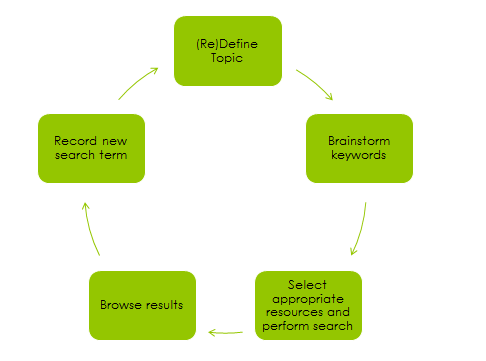Literature search process
Try not to get discouraged if your first search does not bring you to the most relevant resources- the literature search process is iterative. You must actively browse through your results, make note of the terminology used by experts in the literature, and modify your search. This will lead you to the results you are looking for!
Search Strategy
When we search with keywords, we are using our natural language. Keywords are very flexible and are great for capturing the details of our searches. You may also want to use keywords to broadly survey what literature exists on a topic.
However, searching this way can give too many or irrelevant results because different disciplines use terms differently. We may also miss out on finding resources because we are not using the same words as the author. When searching with keywords, it is therefore important to keep in mind:
- Variations in spelling, acronyms
- Synonyms (We must think of all of the words an author might use to describe a topic!)
Keyword Worksheet
Use this sheet to organize your thoughts about your topic and brainstorm additional search terms. You may want to ask someone else to take a look to see if there are terms you haven't thought of.
Search Tips
- Combining terms with AND narrows your search.
- Combining terms with OR broadens your search.
- Put quotation marks around your keywords when you want to keep the phrase exactly in the order that you typed it (ie. "water flea" or "climate change")
- Use an asterisk at the end of a root word to capture all variations (ie. grow* would retrieve grow, growing, growth, etc.)
- If you are finding journal articles that are too complex, try using the keywords review or meta-analysis or systematic review in your search. This may bring up some helpful overviews of the literature on a particular topic but watch out for book reviews!
- When you do find a great article, examine the works cited list to find other, related articles. Use Google Scholar to identify newer research by checking articles that have cited the one you found.


